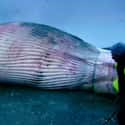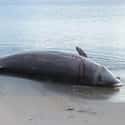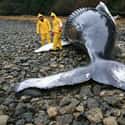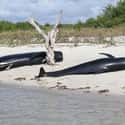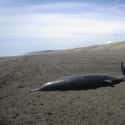-
(#2) For Alive Beached Whales, Lack Of Food And Increase In Gravity Threaten Their Health
Whales are generally considered some of the largest mammals on Earth. Blue whales, for instance, can grow in excess of 100 feet long and 150 tons. In water, this immense weight is supported by the buoyancy of the water itself. On dry land, this weight alone endangers whales due to the pressure exerted on their internal organs. A whale’s thick covering of blubber can also lead to dehydration and the lack of the cool temperature of the water can cause heat extremes for the animals.
Additionally, outside of their natural habitat, the inability to procure food can lead to malnourishment for victims of cetacean stranding. Most whale species require between 2% and 10% of their body weight in food per day. To use the example of the blue whale, dietary needs can be upwards of 40 million krill (small shrimp-like creatures) daily.
-
(#4) Man-Made Whale Combustions Usually Do Not End Well
On November 9, 1970, the picturesque little beach town of Florence, OR, had a problem. An eight-ton, 45-foot deceased sperm whale washed up onto its scenic shores, and the townspeople were trying to figure out what to do with it. The gigantic carcass cooked in the sun, and the smell hit the town hard. Town officials decided to blow the thing to pieces, and let the local waterfowl clean up the resulting mess.
Engineer George Thornton was unsure exactly how much dynamite was needed to disintegrate the thing. A visiting businessman named Walt Umenhofer got wind of the plan and approached Thornton. Umenhofer, a WWII veteran, and warned the engineer that he was using too much. Thornton ignored his advice. The blast was spectacular, and the milling spectators were impressed. But the event was quickly overshadowed by the thousands of pounds of whale entrails that came raining down on the idyllic little town moments later. Reporter Paul Linnman described the scene in the book he wrote after covering the story: “Explosions in the movies usually look like a blast of fire and smoke; this one more resembled a mighty burst of tomato juice.” To make matters worse, Umenhofer’s car was totaled by a piece of blubber the size of a small truck tire.
If you're brave enough, here's a video of the eruption.
-
(#7) There Are Ways To Prevent Beached Whales From Bursting
So what exactly is the best way to dispose of a washed-up whale? There have been several approaches, some more successful than others. The most pragmatic solution to the problem has been cutting the thing open. Creating narrow slits allows the gases caused by decomposition to escape gradually, as opposed to all at once.
Depending on how much gas has built up, this can also be somewhat eventful, even if falling quite short of actual raining meat. Even a controlled release can be downright disgusting and more than a little dangerous. Still, it is infinitely safer than letting a 50-ton rotting meat balloon pop on its own. After the remains are punctured, they can be hauled off for scientific study.
-
(#1) Why Do Whales Beach Themselves?
Understanding why whales beach is integral to understanding why they burst. Usually whales pass away in their natural habitat, and generally have a positive impact, speaking in ecological terms. One good-sized whale can provide nourishment for multiple colonies of deep-sea creatures and communities. Too large for most scavengers to fully consume, whale corpses end up sinking and their tremendous bulk takes them as far down as they can go, where they become home to any number of life forms found on the ocean floor.
If the whale is sick, off course, or just happens to pass away for whatever reason and gets caught up by the incoming tide, it doesn’t take much to bring the massive carcass to shore. Sometimes beached whales are still alive when they beach. In fact, they inadvertently go ashore and are unable to get back to enough water to regain buoyancy. In the past, random strandings from a group would cause a single beaching, but whales are both incredibly social and incredibly loyal creatures. As a result, incidences of mass strandings have been increasing as healthy whales may beach themselves attempting to cling to weaker or off-course pod-mates who've been stranded.
-
(#8) Technology And Science Are Helping People Stop (And Save) Beached Whales
Because of cetaceans' size, a stranded whale doesn't have much chance of survival. When beached whales are alive and cannot manage to get back into the water, the most humane course is euthanasia. Recent technological advances have been a godsend to the dedicated people that work to help return as many cetaceans as possible to deep waters. Most of these people are volunteers, and many work in some aspect of the marine biology field.
In addition to striving to maintain an animal’s temperature and moisture levels manually, they often use sound to motivate whales in danger of beaching to move to deeper water. They use sounds of predators to steer whales away from shallow areas, and sounds of whale pods to lure them toward safer waters.
From boat impacts and sonar technology to man-made climate change, humanity is largely responsible for the problem of whale stranding, but there are several ways humans can help. By judicious use of acoustic deterrent devices, or ADDs, coupled with responsible fishing and commerce practices, humans can reduce whale stranding.
-
(#6) Whale Remains Are Dangerous To Humans - For A Variety Of Reasons
Massive whale carcasses quickly become a hotbed for infection and give off a monstrous stench as they decompose. They also attract dangerous animals scavenging for food, like polar bears and wolves. But that's not the end of it for humans.
What's left of these whales attracts large crowds, and that includes people who aren't too bright. For some reason, people who see whale remains invariably seem to want to stand or ride on the things. These foolhardy people are literally risking life and limb.
Also, as the whale decomposes, the integrity of the creature’s skin weakens. People have been known to actually fall through the decayed membrane into a liquefied soup of putrescent, rotting whale guts. It should also be noted that retrieval of individuals in such a predicament is rather difficult and not always successful. In terms of ways to pass away, drowning in rotten whale innards is probably one of the least-pleasant methods.
New Random Displays Display All By Ranking
About This Tool
Our data comes from Ranker, If you want to participate in the ranking of items displayed on this page, please click here.











